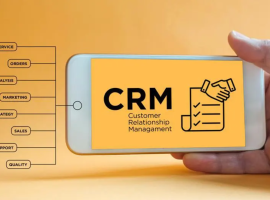How to Customize and Optimize Your CRM Tool for Your Startup: A Guide for Advanced Users
Overview: Maximizing the Potential of CRM customization for startups Success
In the fast-paced world of startups, success hinges on efficient operations, streamlined processes, and meaningful customer interactions. A Customer Relationship Management (CRM) tool is a powerful ally in achieving these goals. Startup success is often synonymous with effective customer management, and a CRM tool serves as the nerve center for organizing, tracking, and nurturing customer relationships. By centralizing customer data, interactions, and insights, an effective CRM customization for startups serves as a spur for thoughtful deliberation and well-thought-out preparation.. This section explores the overarching importance of maximizing your CRM’s potential to propel your startup toward success.
How to Customize and Optimize Your CRM Tool for Your Startup
Embarking on the journey to customize and optimize your CRM tool requires a systematic approach. This section breaks down the process into key steps, offering practical insights and actionable strategies for advanced users.
Identifying Specific Business Processes
Understanding the intricacies of your startup’s unique business processes is the foundational step toward effective CRM customization for startups. Start by conducting a thorough assessment of how different functions within your business operate. This includes sales processes, marketing strategies, customer support workflows, and any other core activities.
Mapping CRM Customizations to Key Business Functions
Once you’ve identified these business functions, the next step is to map out how CRM customization for startups, can align seamlessly with each function. This involves tailoring the CRM tool to accommodate the specific needs and requirements of individual departments. For instance, customizing lead management features for the sales team or implementing specialized marketing workflow automation for the marketing department.
Analyzing Workflow Requirements for Optimal Integration
An essential aspect of CRM API customization for startups is ensuring optimal integration with existing workflows. Analyze how different aspects of your startup’s operations interact and identify points where CRM customizations can enhance efficiency. This could involve integrating the CRM tool with other essential software or platforms to create a unified and cohesive work environment. For optimal integration, you can work closely with our SA Team to analyze workflow requirements.
Defining User Roles and Permissions
When customizing your CRM tool, defining user roles and permissions is akin to creating a personalized keycard system for your business data. Start by identifying the different roles within your startup, such as sales representatives, managers, and support staff. Assign specific permissions to each role based on their responsibilities and the information they need access to. For instance, your sales team might require access to customer contact details and deal information, while your support staff may need access to customer service records. By carefully delineating roles and permissions, you not only enhance security but also streamline your team’s access to relevant data.
Ensuring Secure Access and Data Protection
Security is paramount when it comes to your startup’s data. Once user roles are defined, take additional measures to ensure secure access and data protection. This involves implementing robust authentication methods, such as two-factor authentication, and regularly updating passwords. Limit access to sensitive information by enforcing strict permission settings. Regularly audit user access to identify and address any potential security vulnerabilities promptly. By prioritizing secure access, you safeguard your startup’s valuable data from unauthorized access and potential breaches. Implement our SA Team‘s these suggestions for secure access and data protection.
Customizing User Dashboards Based on Roles
Imagine each team member having a personalized workstation with tools and information tailored to their specific job functions. Customizing user dashboards based on roles achieves just that within your CRM tool. Sales representatives can have quick access to their ongoing deals and leads, while managers can view overall team performance metrics. This not only improves efficiency by eliminating unnecessary clutter but also ensures that each team member has instant access to the information crucial for their daily tasks. A well-designed dashboard boosts productivity and contributes to a more streamlined workflow.
Custom Fields for Startup-Specific Information
Your startup possesses unique aspects that standard CRM fields may not cover. This is where custom fields come into play, allowing you to gather startup-specific information critical for your operations. Identify the specific details relevant to your business, such as industry-specific parameters or customer preferences. By adding custom fields, you create a tailored data collection system that aligns with your startup’s goals and requirements.
Adding Fields for Unique Customer Data
Customers are the lifeblood of any startup, and understanding them on a granular level is key to success. Add custom fields to your CRM to capture unique customer data that goes beyond basic contact information. This could include preferences, historical interactions, or any other information crucial for delivering personalized and targeted services. The ability to tailor your approach based on detailed customer insights can significantly enhance customer satisfaction and loyalty.
Customizing Lead and Deal Stages for Sales Pipelines
The sales journey is rarely a one-size-fits-all process. Customizing lead and deal stages within your CRM allows you to align the sales pipeline with your startup’s unique approach. Tailor these stages to reflect the specific milestones and criteria relevant to your business. For instance, a startup in the B2B sector might have stages like “Initial Consultation,” “Proposal Submission,” and “Contract Negotiation.” This customization ensures that your sales team follows a process that mirrors your startup’s specific sales cycle, enhancing the accuracy of sales forecasts and improving decision-making.
Streamlining Data Entry Processes
Efficient data entry is the backbone of any successful CRM system. To streamline this process for your startup, consider implementing user-friendly interfaces and intuitive forms. Simplify the data entry fields to include only essential information, reducing the time and effort required for your team to input data.
Utilizing Data Validation Rules for Accuracy
Maintaining accurate data is paramount for effective decision-making. Implementing data validation rules ensures that the information entered into your CRM meets predefined criteria. For example, you can set rules to validate email formats, numerical ranges, or mandatory fields. This not only enhances the accuracy of your data but also prevents errors that can arise from inconsistent or incorrect entries.
Workflow Automation for Repetitive Tasks
Automating repetitive tasks is a key strategy for boosting productivity and minimizing manual errors. Identify tasks within your startup’s workflow that are repetitive and time-consuming, such as data updates, lead assignments, or follow-up reminders. Utilize the workflow automation capabilities of your CRM to handle these routine tasks automatically.
Setting Up Advanced Email Automation Sequences
Email communication plays a crucial role in nurturing leads and maintaining customer relationships. Setting up advanced email automation sequences within your CRM allows you to personalize and automate your email campaigns. Develop sequences that trigger based on specific actions, such as lead status changes or interactions with your website. This ensures that your startup communicates effectively with leads and customers without overwhelming your team with manual email tasks.
Customizing Workflows for Efficiency
Consider the following steps to optimize workflows for efficiency:
- Identify Key Processes: Break down your business processes into specific tasks and steps. Understanding each stage of a process allows you to customize your CRM workflow automation accordingly.
- Streamline Communication: Customize your CRM to facilitate seamless communication between team members at each stage of a process. This might involve automated notifications, status updates, or shared task lists.
- Automation for Routine Tasks: Identify routine and repetitive tasks within your workflows. Automate these tasks within the CRM to reduce manual effort, minimize errors, and free up valuable time for your team.
- User-Friendly Interfaces: Ensure that your customized workflows are user-friendly. Intuitive interfaces make it easier for team members to navigate and complete tasks, enhancing overall efficiency.
- Feedback Loops: Implement feedback mechanisms within your CRM workflows. This allows team members to provide input on the effectiveness of existing processes, leading to continuous improvement.
Integrating Third-Party Apps and Tools
The ability to integrate your CRM with third-party apps and tools extends its functionality and enhances overall productivity. This integration opens up possibilities for consolidating data, automating tasks, and improving collaboration. Here’s a closer look at how you can leverage third-party integrations:
Exploring CRM Integrations with Marketing Tools
- Centralized Customer Data: Integrate your CRM with marketing tools to centralize customer data. This ensures that your marketing team has a comprehensive view of customer interactions and preferences.
- Automated Campaigns: Streamline marketing campaigns by integrating your CRM with email marketing tools. This allows for automated email sequences, targeted messaging, and personalized communication based on CRM data.
- Lead Tracking: Ensure seamless lead tracking by integrating your CRM with marketing analytics tools. This integration provides insights into the effectiveness of marketing efforts and helps refine strategies.
Enhancing Collaboration with Project Management Integrations
- Unified Information: Integrate your CRM with project management tools to unify information related to customer projects. This ensures that teams have a holistic view of customer interactions and project progress.
- Task Automation: Automate task creation and assignment by integrating your CRM with project management platforms. This reduces manual effort and enhances task visibility across teams.
- Real-Time Collaboration: Foster real-time collaboration by integrating communication tools with your CRM. This can include chat applications, allowing team members to discuss and address customer-related issues promptly.
Building Custom Reports for Startup Metrics
When it comes to tracking the performance of your startup, generic reports might not cut it. Building custom reports tailored to your specific startup metrics is essential for gaining meaningful insights. Identify key performance indicators (KPIs) that align with your business goals. These could include metrics like customer acquisition cost, conversion rates, or product engagement.
Analyzing Sales Performance with Custom Reports
One of the crucial aspects of startup success is understanding and optimizing your sales performance. With custom reports, you can delve deep into your sales data to identify patterns, trends, and areas for improvement. Track the effectiveness of your sales strategies, analyze the performance of individual sales representatives, and assess the success of different product lines. This granular analysis enables you to make data-driven decisions to enhance your sales approach.
Creating Dashboards for Real-Time Insights
In the fast-paced world of startups, having real-time insights is invaluable. Develop dashboards for real-time insights into key performance indicators as our SA Team always recommends this approach for staying ahead of the curve. Creating dashboards that provide a snapshot of your startup’s performance at any given moment allows you to stay agile and responsive. Utilize visualizations such as charts and graphs to represent data in a clear and easily understandable format. These dashboards can include real-time updates on sales figures, customer interactions, and other critical metrics. The ability to access this information on-demand empowers your team to make timely decisions that can positively impact your startup’s trajectory.
Advanced Data Analysis with CRM Analytics Tools
In this section, we delve into the advanced capabilities of CRM analytics tools. These tools go beyond basic data tracking and reporting. They enable your startup to conduct sophisticated data analysis, uncovering meaningful insights and trends. By harnessing these analytics tools, you can gain a deeper understanding of customer behavior, preferences, and market dynamics.
Utilizing Predictive Analytics for Sales Forecasting
Predictive analytics takes data analysis to the next level by using historical data to make predictions about future trends. For startups, this means being able to forecast sales with greater accuracy. By identifying patterns and trends, predictive analytics helps in anticipating customer needs and market changes. This enables your business to proactively adjust strategies, allocate resources efficiently, and stay ahead in a competitive landscape.
Customizing Reports for Investor and Stakeholder Presentations
When communicating with investors and stakeholders, the ability to convey relevant information clearly is crucial. This involves customizing reports within your CRM to highlight key metrics, achievements, and financial data. Visual elements such as charts and graphs can be used to present complex information in an easily understandable format. Customized reports enhance transparency, build confidence, and facilitate productive discussions with external partners.
Training and Support for Advanced CRM Users
This section emphasizes the importance of providing training and support for your team to make the most of advanced CRM features.
Conducting Advanced User Training Programs
As your startup grows, so does the complexity of your CRM system. Conducting advanced user training programs ensures that your team is equipped to handle the intricacies of the CRM tool. This involves in-depth training on customization options, analytics tools, and other advanced functionalities. By investing in ongoing education, you empower your team to leverage the full potential of the CRM system, leading to improved efficiency and effectiveness.
Customizing and optimizing your CRM modules for startups, requires a thoughtful approach. By aligning the CRM with your specific business processes, defining user roles, and taking advantage of advanced features, you can create a powerful tool that contributes to the success of your startup. Regularly evaluate and update your customizations to ensure they continue to meet the evolving needs of your growing
- Ed-Tech Giant PhysicsWallah’s IPO Opens on November 11 and has a ₹103–109 Price Range - November 6, 2025
- Bhavish Aggarwal: The Visionary Behind Ola Electric - August 31, 2025
- OLA: History of A Startup Giant - August 30, 2025




